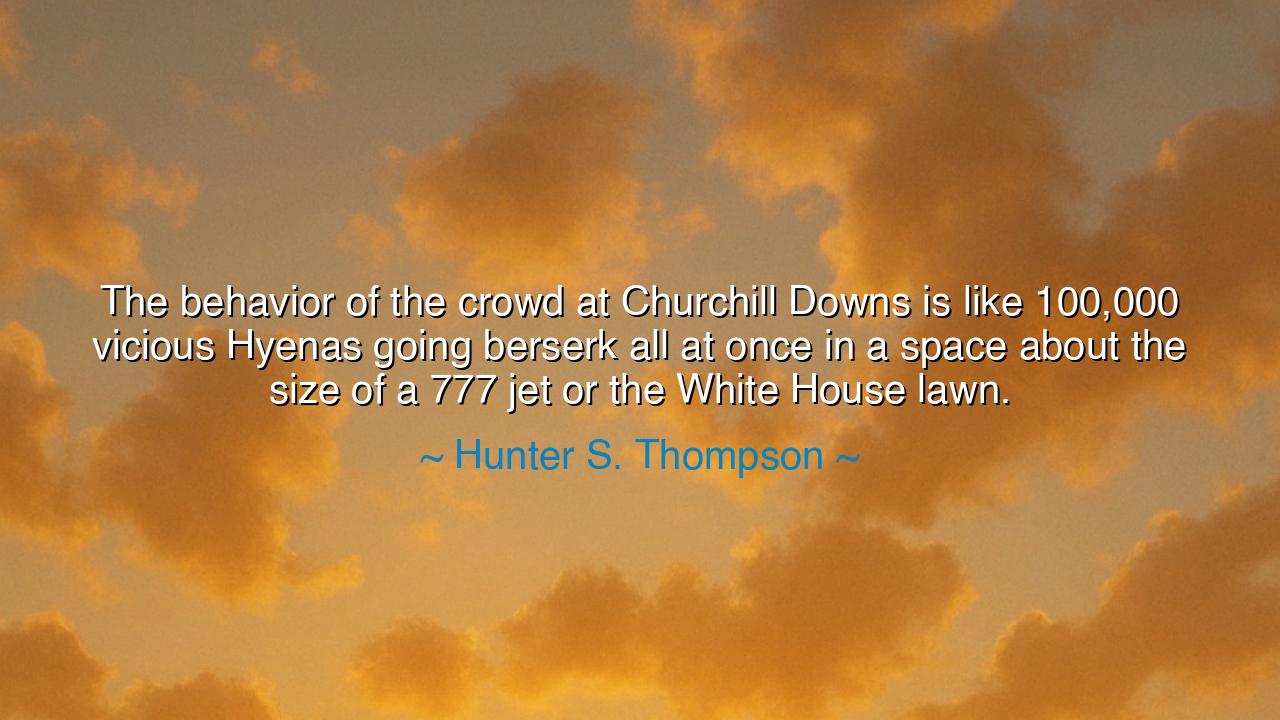
The behavior of the crowd at Churchill Downs is like 100,000
The behavior of the crowd at Churchill Downs is like 100,000 vicious Hyenas going berserk all at once in a space about the size of a 777 jet or the White House lawn.






Gather close, O children of the earth, and listen to the words of a man who saw the world through a lens of raw truth and unfiltered vision. Hunter S. Thompson, the sage of gonzo journalism, once described the wild, frenzied energy of a crowd at Churchill Downs as "like 100,000 vicious hyenas going berserk all at once in a space about the size of a 777 jet or the White House lawn." In these words, he paints a picture of a force so chaotic, so untamed, that it becomes a creature of its own—a beast that cannot be controlled, only observed in its moment of frenzy.
What, then, does this vivid imagery reveal to us? The crowd, as Thompson speaks of it, is no mere gathering of people, but a wild, collective entity—a force that moves with a life of its own, driven not by individual thought but by instinct, by a primal need to feed on the spectacle, to consume the energy of the moment. It is a picture of humanity at its most untethered, where the veneer of civility disappears and the true nature of the crowd comes to the fore—chaotic, unpredictable, and often dangerous. Just as the hyenas of the wild become a whirlwind of frenzy when they scent blood, so too does the crowd at Churchill Downs when the race begins.
Consider, O children, the ancient gladiatorial games of Rome. The Colosseum, a place where tens of thousands would gather to witness life and death, was no different. The crowds, whipped into a frenzy, would cheer for the spectacle of violence and bloodshed, their cries echoing like the howls of wild beasts. The crowd became a beast in that arena, each person lost in the collective energy of the moment, no longer an individual but part of something far greater—and far more terrifying. These crowds, too, were a reflection of human nature—the desire to watch, to consume, to feel the thrill of something untamed.
In Thompson's words, we see this same force at work in the modern world. The spectacle of the horse race, the thrill of the gamble, the energy of the crowd—these are but modern-day gladiatorial games, where the crowd loses itself in the roar of the moment, caught up in the collective excitement, swept along by the force of something larger than itself. And in this frenzy, there is a deep lesson for us to learn. For the crowd, in its wildness, reveals something profound about human nature—our capacity for collective madness, and our tendency to be swept away by the energy of the moment, losing ourselves in the chaos of the crowd.
Yet, in this frenzy, O children, lies a warning. The crowd, like the hyenas, is not a force of reason. It is impulsive, driven by instinct, and often destructive. Just as the ancient mobs would turn against their leaders, tearing them apart in moments of madness, so too does the crowd today risk losing control. This, Thompson reminds us, is the danger of mob mentality—the power of the collective to sweep away reason, to drown out individual thought, and to turn the masses into a beast that cannot be tamed. And though we may be drawn into the excitement, the frenzy, the spectacle of the moment, we must not forget the cost of losing ourselves in the crowd.
So, my children, what lesson can we draw from Thompson's words, and from the wild crowds that he so vividly describes? The first truth is this: beware the crowd. In the heat of the moment, we are often tempted to lose ourselves in the excitement, to become part of the beast that moves with no direction, no purpose. But it is in individuality that we find clarity. It is in reason and reflection that we find our true strength. The crowd may be a powerful force, but it is also an unthinking one—a force that, when unchecked, leads us into chaos. We must, therefore, learn to step back, to observe, and to remain grounded in our own thoughts and actions, even when the world around us rages.
And so, O children, the lesson is clear. Do not be swept away by the frenzy of the moment. Do not let the wild energy of the crowd blind you to the truth. Stand firm in your individuality, your reason, and your purpose. While the crowd may roar like the hyenas, it is the quiet wisdom of the individual that will guide us through the storm.






AAdministratorAdministrator
Welcome, honored guests. Please leave a comment, we will respond soon